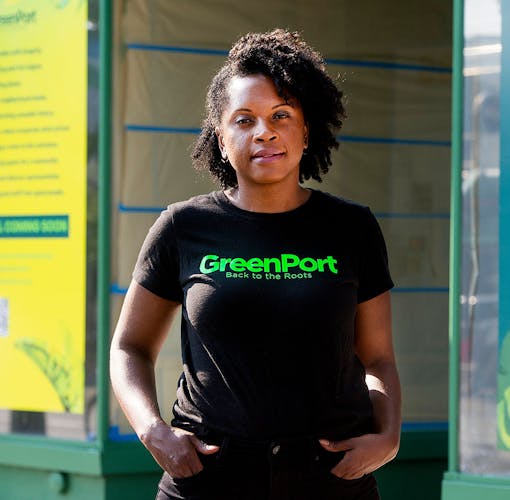*Plus, their advice for BIPOC entrepreneurs considering the space
The recreational cannabis space in Canada has experienced its fair share of peaks and valleys since legalization nearly two-and-a-half years ago.
At this point, most of the brands and industry leaders we’ve come to know and love are settling in for the long haul, but there remains an unspoken issue about the space: it’s really white.
Just 1% of people in C-suite positions in Canada’s cannabis sector are Black, 84% are white and of those, 86% are men, according to the 2020 report by the Centre on Drug Policy Evaluation and the University of Toronto.
Other underrepresented minorities include South Asian (6%), East and Southeast Asian (3%), Indigenous (2%), Arab (2%) and Latinx (1%).
There’s much work to be done before BIPOC communities are more equally represented in the cannabis space, but the 1% of Black business leaders who are choosing the industry are making incredible waves.
Here are four Black Canadian cannabis change-makers you need to know.
Ashley Athill, HRVSTR

Who: Ashley Athill
What: Co-founder of HRVSTR
Why you should get to know them:
Ashley and her brother Michael are defying that old “don’t-go-into-business-with-family” adage with HRVSTR, a premium cultivation facility that supplies craft cannabis to the Ontario Cannabis Store.
How the space is feeling, in their own words:
“The cannabis industry is evolving rapidly and we are so appreciative to be part of the current ecosystem of license holders. HRVSTR is always looking for opportunities to expand our cultivation, processing capacity, and our brand.
Farmgate (a federally-regulated, direct-to-consumer sales platform) is currently one of the few options that allow small- and medium-sized cultivators and processors to add another layer of uniqueness to their offering.
It’s exciting! While many things are in our control, better opportunities will come from coordinated lobbying efforts with Health Canada.
I recently became a Director for C3 (Cannabis Council of Canada) and I’m so proud to be part of this group that actively works towards creating a better cannabis industry in Canada.
It will take a lot of effort and dedication, but I am looking forward to seeing changes to lounges, cannabis tourism, and an increase in BIPOC inclusivity.”
Their advice for BIPOC entrepreneurs considering the Canadian cannabis space:
1. Find your niche and don’t forget to connect to your happiness.
2. Do your homework.
3. Network and understand the landscape of cannabis in Canada.
4. Explore not-for-profits like The SEED Initiative for additional support and resources.
Drew Henson, TOQi

Who: Drew Henson
What: Founder of TOQi
Why you should get to know them:
Drew took his background in design and business and applied it to the cannabis space to launch TOQi, the first-ever wireless charging vaporizer, compatible with Qi wireless charging.
How the space is feeling, in their own words:
“From an industry perspective, I’m excited to see more women of colour in leadership roles.
In the design community, there’s a heavy underrepresentation of women-identifying designers and sadly that’s the same situation in the cannabis community, especially WOC, so I’m looking forward to seeing this improve, as it must.
From a consumer perspective, I’m excited to see this current generation of technology utilized and featured in upcoming new products. I’m inspired by the creativity of the designers in the cannabis space, and the collaborative ethos that I’ve experienced, so I can’t wait to see what everyone’s been working on.
Cannabis is becoming more refined and sophisticated, and consumption methods have to keep up, so we should be seeing a lot of cool, interesting new technology products rolling out.”
Their advice for BIPOC entrepreneurs considering the Canadian cannabis space:
“I would ask them how they feel about being 2% of the industry and then I would ask them, ’what does that make you want to do?’ I advise them to reflect upon that question and their answer before they enter the industry because they’re going to face that question every day.
Know that there will be many people who don’t see you as a talented entrepreneur but instead question your credibility to be in this industry.
The best way to combat that is to be able to articulate and navigate regardless of the room that you’re in. More than anything else, learn why the cannabis industry is a science, and not a hobby.”
Vivianne Wilson, GreenPort Global

Who: Vivianne Wilson
What: Founder of GreenPort Global
Why you should get to know them:
Vivianne is the first Black woman to open an independent cannabis retail shop in Canada. Her store, GreenPort, is located in Toronto’s Little Italy neighbourhood on College Street.
How the cannabis space is feeling, in their own words:
“I was drawn to the cannabis sector because it was a brand-new industry with the potential to create new opportunities and revitalize culture and communities across the country.
But four years later, we are nowhere closer to what I had envisioned or what others before me had advocated for. In actuality, we are moving further away from culture and community every day.
That said, what continues to fascinate me about this sector is the folks I encounter who are still enthusiastic about what they do. I have people on my team and in my network who are truly inspirational.
They have a vision for themselves and the industry, which they are still pursuing. They literally are still dancing to their own soundtrack. These are the folks, in my opinion, who will leave a legacy of the legal cannabis industry that people will talk about and that tourists will flock to see.”
Their advice for BIPOC entrepreneurs considering the Canadian cannabis space:
“Work hard to carve out your own niche. Make something that you can be proud of and that is uniquely yours. To do so, you truly just have to create something, no matter how small.
These past two years have taught me that sometimes I have to carve out my own path to reach where I need to go. Even during these challenging times, I’ve found my carved-out path to be significantly more fulfilling.
Furthermore, interacting with the plant isn’t required when entering the cannabis realm. One of the ’easiest’ methods to get started is to pivot your present role/business to provide an ancillary service.
Someone with a background in marketing, construction, or training, for example, may apply those skills to the cannabis industry by spending the time to grasp the subtleties and restrictions.
Finally, don’t look at the top players and think that you need millions of dollars to get started—you don’t. Many of these top players have spent billions and have lost billions.”
Keenan Pascal, Token Naturals

Who: Keenan Pascal
What: CEO of Token Naturals
Why you should get to know them:
Keenan is the mastermind behind Token Naturals, a federally licensed Edmonton-based business that develops and manufactures white-label cannabis products for a number of licensed producers and their own brands.
How the cannabis space is feeling, in their own words:
“The expansion of brands in 2.0 products means new options are filling out the category offering for drinks, edibles, topicals, etc. As the industry evolves and optimizes, it should get easier for smaller brands to participate in the market.
That’s one of our main goals as a manufacturer: to reduce the barriers to entry and make it easier for producers of all sizes to get their products onto shelves.”
Their advice for BIPOC entrepreneurs considering the Canadian cannabis space:
“Don’t be afraid to ask for a seat at the table. There is a lot of value for a company in bringing in diverse thoughts, backgrounds and experiences. The world is realizing more and more how true this is, but you don’t have to wait on the sideline to be invited.
There are a lot of people waiting in the wings who would love to know how to best support and sponsor. Ask for help; it is not a sign of weakness. The team you build around yourself through peers, mentorship, staff, and friends—it’s all going to pay huge dividends if you’re willing to put yourself out there in the community.”





